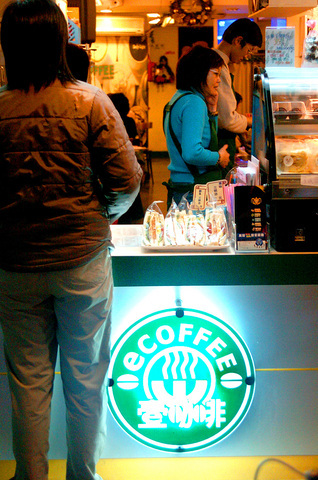President Starbucks Coffee Corp (
"The US headquarters directly commissioned its local attorney to file a complaint over E-Coffee's trademark registration, as the similarity in logos misleads consumers," President Starbucks' public relations officer Bonnie Chao (趙仁安) said yesterday.

PHOTO: SEAN CHAO, TAIPEI TIMES
The case is currently under investigation, Chao said.

PHOTO: SEAN CHAO, TAIPEI TIMES
She said that President Starbucks only found out about its US counterpart's intention to file a complaint on Thursday.
Chao said that she could not comment further, as President Starbucks does not have any involvement in the complaint.
President Starbucks, a 50-50 joint venture, has over 142 outlets across the nation, according to the coffee operator.
The US coffee giant lodged a complaint in October last year to the Intellectual Property Office (IPO) under the Ministry of Economic Affairs over E-Coffee's trademark registration, saying that the similarity would confuse consumers.
E-Coffee has not yet responded to the complaint, the IPO's section chief Chang Hui-ming (
Since the investigation is still at an early stage, the IPO may require more than a year to reach a decision, Chang said.
Starbucks in the US is reportedly also considering complaints against E-Coffee outlets in a number of other countries, including Hong Kong, China, Singapore, and Japan, where E-Coffee's trademark is registered.
E-Coffee, which has more than 280 franchised outlets, denied that its logo is misleading or infringes upon Starbucks' trademark, according to a report in the Chinese-language media citing the company's president Sam Yen (顏文山).
"We are not the only coffee store in Taiwan using a logo featuring dual circles," Yen is reported to have said.
A number of coffee chain stores, including Barista Coffee (西雅圖咖啡) and IS Coffee (伊是咖啡), use circle motifs in their logos.
E-Coffee's logo features a cup of steaming coffee, which is not at all similar to Starbucks' mermaid with curly hair, Yen said.
Yen said that E-Coffee will not settle the dispute unofficially, and does not rule out the possibility of filing a lawsuit if the IPO delivers an unfavorable ruling.

Sweeping policy changes under US Secretary of Health and Human Services Robert F. Kennedy Jr are having a chilling effect on vaccine makers as anti-vaccine rhetoric has turned into concrete changes in inoculation schedules and recommendations, investors and executives said. The administration of US President Donald Trump has in the past year upended vaccine recommendations, with the country last month ending its longstanding guidance that all children receive inoculations against flu, hepatitis A and other diseases. The unprecedented changes have led to diminished vaccine usage, hurt the investment case for some biotechs, and created a drag that would likely dent revenues and

Global semiconductor stocks advanced yesterday, as comments by Nvidia Corp chief executive officer Jensen Huang (黃仁勳) at Davos, Switzerland, helped reinforce investor enthusiasm for artificial intelligence (AI). Samsung Electronics Co gained as much as 5 percent to an all-time high, helping drive South Korea’s benchmark KOSPI above 5,000 for the first time. That came after the Philadelphia Semiconductor Index rose more than 3 percent to a fresh record on Wednesday, with a boost from Nvidia. The gains came amid broad risk-on trade after US President Donald Trump withdrew his threat of tariffs on some European nations over backing for Greenland. Huang further

CULPRITS: Factors that affected the slip included falling global crude oil prices, wait-and-see consumer attitudes due to US tariffs and a different Lunar New Year holiday schedule Taiwan’s retail sales ended a nine-year growth streak last year, slipping 0.2 percent from a year earlier as uncertainty over US tariff policies affected demand for durable goods, data released on Friday by the Ministry of Economic Affairs showed. Last year’s retail sales totaled NT$4.84 trillion (US$153.27 billion), down about NT$9.5 billion, or 0.2 percent, from 2024. Despite the decline, the figure was still the second-highest annual sales total on record. Ministry statistics department deputy head Chen Yu-fang (陳玉芳) said sales of cars, motorcycles and related products, which accounted for 17.4 percent of total retail rales last year, fell NT$68.1 billion, or

MediaTek Inc (聯發科) shares yesterday notched their best two-day rally on record, as investors flock to the Taiwanese chip designer on excitement over its tie-up with Google. The Taipei-listed stock jumped 8.59 percent, capping a two-session surge of 19 percent and closing at a fresh all-time high of NT$1,770. That extended a two-month rally on growing awareness of MediaTek’s work on Google’s tensor processing units (TPUs), which are chips used in artificial intelligence (AI) applications. It also highlights how fund managers faced with single-stock limits on their holding of market titan Taiwan Semiconductor Manufacturing Co (TSMC, 台積電) are diversifying into other AI-related firms.